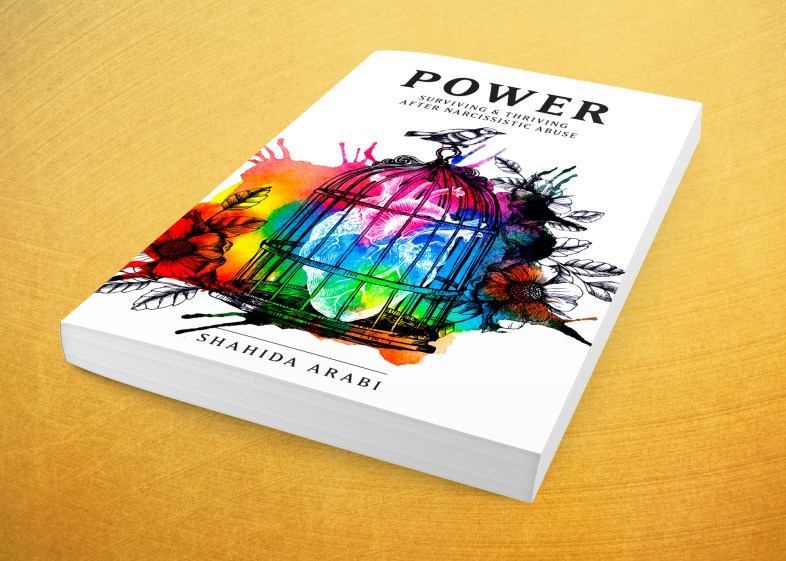
30 Kickass Affirmations For Going No Contact With An Abusive Narcissist
I love myself. Truly and always, I love myself. And for the first time in a long time, I am putting myself first.

No Contact from a narcissistic or otherwise abusive, toxic ex-partner can be a rewarding and challenging time. Survivors of emotional and/or physical abuse are not only paving a new path to freedom and rebirth, they may also be struggling with the effects of cognitive dissonance, fear, obligation and guilt (FOG), as well as the traumatic effects of the abuse on their minds, bodies and spirits. They may also encounter stalking or harassment from their abusive partners in their attempts to detach from them, especially if they ‘dared’ to leave those partners first.
Due to biochemical and trauma bonding with their abusers, survivors may also struggle to not contact their ex-partner or check up on them due to being conditioned to rely upon their abuser’s approval and validation during the abuse cycle as a survival mechanism.
Considering the fact that detoxing from an abusive relationship is very much like recovering from an addiction, ‘rehab’ from this type of toxicity needs to be addressed in a way that is both compassionate and empowering.
These positive affirmations can help you reconnect back to your sense of reality when you may be plagued by emotional flashbacks, triggers or cravings to reconnect with an abusive partner. I’ve also included brief explanations of each affirmation, in case any of them need further clarification in order to better appreciate the underlying meaning for each.
For those who may have implemented Low Contact due to co-parenting with an abuser, you can feel free to customize these various phrases to best suit your situation. You may also want to brainstorm your own affirmations that are best tailored to your unique needs and desires.
1. Every act of silence is a protection against psychological violence.
Every time you choose not to check up on, respond or reach out to an abusive ex-partner, you demonstrate that you value yourself, you value your time, your new life and your right not to be subjected to abuse or mistreatment. You protect yourself from traumatizing information or emotional violence that could further retraumatize you and ensnare you back into an abuse cycle. A cycle that can only expose you to more pain, heartache and a pervasive sense of hopelessness. You have escaped from the abuse – don’t let yourself reenter the cycle right back into a seemingly inescapable situation again. It can get more and more difficult to leave each time you do.
2. I have a right to be free from abuse. Every human being has that right and I do, too.
We have to remember that we are just like any other human being – including those who have never been in an abusive relationship or those who have never tolerated any form of abuse if they encountered it. They had the right not to be abused and we do too. This is not to blame or shame anyone who has stayed in an abusive relationship; there are many reasons why abuse survivors stay well beyond the first incident of abuse, including the trauma repetition cycle that arises due to subconscious wounding from childhood. This is simply a reminder that there are many people who are in healthy relationships – and as a human being, you are so worthy of the same.
3. No one can take away the power I have within me.
It may come as a surprise to you, but narcissistic abusers don’t actually hold any authentic inner power – they take away power from others because they have none within themselves. They have no sense of core identity – they need us more than we need them (even if it feels otherwise). They leech off of our light – we are their life source, their narcissistic supply and they are the energetic vampires who live off our resources, our talents, and our empathy and compassion.
4. My will is stronger than an abuser’s attempts to bully me.
If you’re suffering from PTSD or Complex PTSD and you’re hearing your abuser’s voice and/or are being met with hoovering attempts to shame you back into the abuse cycle, you’re not alone. Many survivors of abuse are left reeling from the bullying behavior of their ex-partner. They cannot understand why their abusive ex-partner refuses to leave them alone, stalks or harasses them, or even goes so far as to flaunt their new source of supply to them as a way to provoke them. Remember: the abuser’s tactics cannot work on you as effectively if you are willing to prioritize your freedom over their attempts to bully you. The bullying may hurt and you will have to address it as you process the trauma, but where there is a strong will, there is an even stronger survivor who can meet any challenge along the way.
5. I am stronger than empty threats.
Abusive ex-partners may smear you, slander you or even threaten to release personal information about you, especially if you ‘discard’ them first due to narcissistic rage and injury. They want to regain power and control to put you through an even worse discard and essentially ‘win’ the break-up or save face after the ending of the relationship. Much of these are empty threats. It’s true that more dangerous narcissists may follow through with their threats, but the point is that you can choose how you respond to their threats. You have choices and options to protect yourself and document those threats in case you need to ever take legal action. You can go to law enforcement if you have to (and feel safe doing so). You can also seek support from a lawyer and/or counselor who can offer you insights into your particular situation. What you don’t have to do is give into the threats of emotional blackmail and go back into an abusive relationship only to be terrorized in an even worse fashion than before. Who wants to be in a relationship where you are coerced back in?
6. I will defend and protect myself, no matter what.
Whether that means getting a restraining order, changing your number or blocking them from all social media platforms, do whatever you need to do to protect yourself from the narcissist’s manipulation and abuse on your journey to No Contact (or Low Contact if co-parenting). You don’t deserve to be retraumatized, in any shape, way or form. Seek support from your local domestic violence shelter (yes, emotional abuse is still violence), find a trauma-informed therapist, research local support groups, Meetups or group therapy focused on trauma recovery and support. Find any and all support you can to help build and reinforce the fortress of protection around you. The more quality support you have, the more confident you’ll be in moving forward without your toxic ex-partner.
7. I never give up; I keep going.
No matter how difficult it becomes, you never give up. Even if you make a mistake, all is not lost. How do you beat an addiction? You don’t let imperfection impede you from progressing on your path. You keep going. If you fell off the wagon and broke No Contact (whether by checking up on the narcissist or responding to them), don’t judge yourself too harshly. Self-judgment leads to the same sense of unworthiness that leads you back into looking for validation from toxic people. Instead, get back on the wagon and commit yourself to the journey even more fully. Practice mindfulness and radical acceptance of any urges you might have without acting upon them and participating in more self-sabotage. Know that every setback is simply bringing up the core wounds you need to heal in order to move forward with even more strength and determination than before. Understand the triggers that led to your decision to break No Contact to mitigate them in the future and grieve for the illusion the narcissistic abuser presented to you (the ‘false mask’ they presented). Know that this person never truly existed and that the promise of a relationship that was fabricated in the idealization phase led you to an investment that ultimately led to more loss than gain.
8. My life is worth more than empty promises.
When a narcissistic abuser is hoovering you, they are re-idealizing you and making the same promises they made in the beginning of the relationship. They promised to change, to love and care for you, to always support you and be there for you. Yet they invalidated, belittled and degraded you instead. These empty promises are just another way to control and coerce you back into the abuse cycle. Don’t feed into the illusion of what the relationship could have been. Instead, acknowledge it for what it was: moments of terror merged with false promises that were never carried out. You deserve more than empty promises: you deserve the real thing. The true promise of a new and healthier life awaits you: make a promise to yourself that you will pursue that new reality instead.
9. This is life or death and I choose life. Every time.
Many abuse survivors have a high level of resilience as well as a pain threshold that could rival a sumo wrestler or someone walking on hot coals without so much as a grimace. Even if you feel like you can ‘deal with’ further abuse even after the break-up, consider that this is truly a life or death situation. If you are escaping from a physical abuser, this affirmation hits home. Yet even if you’re coming out of an emotionally abusive relationship, it also holds weight. I know many might not think of emotional violence as a life or death situation, but considering the suicides that occur from bullying and domestic violence and the fact that domestic violence survivors are actually at a higher risk of committing suicide, it is truer than we think. Each time we sacrifice our peace of mind for one more ‘hit’ of the abuse rather than detoxing from the relationship, we also belittle, demean and abuse ourselves. These incidents build up collectively to reenact the same sense of hopelessness we had during the abusive relationship and can pose severe harm to our psyche over time due to the cumulative impact of traumatic and retraumatizing experiences. By breaking No Contact, we convince ourselves that we are unworthy of something more than being with a toxic person. In the case of life or death, be sure to choose your new life without your abuser…each and every time.
10. Loneliness is infinitely better than any form of abuse.
After an abusive relationship, we may begin to romanticize our ex-partner in times of loneliness. We might even wonder if it was ‘worth’ leaving the abuse since we now feel so alone. We may have mixed emotions about our abuser as the “good times” come flooding back in the absence of our abuser.
The ‘good memories’ we had with our abuser never justify the abuse or make up for them. Loneliness can be a sign that you are working through and processing the trauma. It’s a sign that you may need to be more present with yourself and surround yourself with better support networks. It’s also a sign that you are in dire need of learning to enjoy your own company. Acknowledge and validate the loneliness, but don’t resist it by pursuing more toxic people or going back to the same toxic relationship. Survivors often need a period of self-isolation to reflect and recover from the trauma before they date or pursue new friendships. Take this time to heal and don’t rush the process: it’s very much needed in order for you to be in an optimal state of mental health. The more healed you are, the better the quality of your future relationships will be, whether with new friends and/or partners.
11. I deserve so much more than to be an emotional punching bag.
When you’re in an abusive relationship, you are not in a healthy, reciprocal relationship. You are an emotional punching bag for an immature and unstable person. They get to take all of their flaws, their insecurities, their internal garbage and spew it onto you. Throughout the relationship, you were trained by your abuser to ‘take it’ as a natural part of being in a relationship with them. No more. You deserve more than to be someone’s emotional punching bag. You deserve a mutually respectful relationship where love and compassion are the default.
12. I can communicate my feelings to people who deserve to hear my voice.
We don’t have to use our voice with people who are committed to misunderstanding, invalidating and mistreating us. We can reserve our energy and time for people who are willing to see our beautiful qualities and celebrate them. We can use our voice for people who truly want to help us, who appreciate our help and reciprocate our efforts. Instead of wasting your precious voice on people who will always be intent on silencing you, why not use it to help those who really need it, to comfort someone who is just as empathic and compassionate as you are, to receive insights from a trusted professional or to share your story and change the world? I guarantee you that helping people who are actually able to evolve (and this includes yourself!) is a much better use of your voice than trying to convince a person without empathy to treat you well. It’s more likely to be effective, too!
13. My mental health is my number one priority.
Make sure you’re engaging in extreme self-care during the No Contact journey. This means checking with yourself every moment of the day to ensure that you are thinking healthy thoughts, taking advantage of the diverse healing modalities available to you, and addressing any symptoms of trauma that may be interfering with your ability to function in day-to-day life. If your mental health is suffering, all other aspects of your life will also feel the impact. So take care of yourself – and don’t be afraid to seek professional support if you need it. No one should have to go through this turmoil alone.
14. Staying sane is more important than being validated by an abuser.
Often when we have been devalued by an abuser, we become controlled by the need to be validated by them as ‘worthy.’ This need becomes especially amplified when we see that the abuser seems to have moved on with a new victim. This is because the abuser was the source of our pervasive sense of unworthiness throughout the abuse cycle and we now feel as if we need confirmation that we were not the problem. Unfortunately, the reality is that narcissistic abuse will inevitably leave us without any closure from the toxic ex-partner. Narcissists are masters of impression management and they rarely expose what is actually happening behind closed doors – so all you are likely to see is them idealizing their victims for the public, just like they did with you. That’s why you must prioritize your own sanity by accepting that while you may never get closure or confirmation of your worth from the narcissist, you can find ways of cultivating your own belief in your self-worth. This means stepping away from the narcissist’s public façade and investing in living your own best life.
15, 16, and 17. I trust my own reality. I know and trust what I experienced and felt. I validate myself.
These are a set of affirmations that can help you to resist the gaslighting attempts of your ex-partner or their harem.
This affirmation is here to remind you that despite the amount of people your abuser may have fooled, no one has the right to take away the reality of the abuse that you endured. You know what you experienced – you know how valid it was and the impact that it left upon you. It doesn’t matter how charming the narcissistic abuser is or who chooses to believe them; let their harem members learn at their own pace who the narcissist is. You’re not here to convince anyone. You’re here to validate yourself and resist the gaslighting attempts to distort your reality and that of the abuse. Don’t feel obligated to protect your abuser, minimize, rationalize or deny the abuse you endured. Honor and acknowledge your authentic emotions as well as depth of trauma you experienced.
18. I am worthy, I am beautiful (or handsome), I am brave, I am strong, I am fearless.
These are another set of positive affirmations that can help remind you of how worthy and courageous you truly are, with or without a partner. It conditions you into believing good things about yourself, especially if you’re used to hearing harsh words from your abuser. I recommend recording these into a tape recorder or voice recording application on your phone and listening to them on a daily basis just to get yourself used to hearing them. Repetition is essential to deprogramming the harmful messages your abuser instilled in you and reprogramming your mind for future success.
19. Each second, each minute, each hour, each day, each month, each year, I am getting stronger.
While you may have moments of powerlessness and hopelessness from time to time, rest assured that as you move forward with No Contact, you will gain more and more strength and resilience than you ever knew was possible. As more time passes and as more trauma is processed and addressed, the more space you’ll carve out to become the person you were meant to be. You’ll eventually reach a point in your healing journey where the strong attachment to the abusive person has ‘dulled’ in its emotional potency.
20. Leaving (or being left) was the best thing that ever happened to me. I made that happen.
It was your agency and your powerful light that got you through the worst moments of your life so never underestimate your ability to survive after the abuse. There are so many victims still in abusive relationships – including the new source of supply. You’ve awakened and you’ve taken back control over your life. This is a blessing that should not be taken for granted. Instead of focusing on the ways you still feel trapped, validate your grief while allowing yourself to celebrate the ways you’ve been freed.
21. I am a motherf*cking badass. I can survive anything. And I will thrive.
For those who need that extra punch (and dose of profanity along with their reality check), this affirmation can charge you with the determination and badassery needed to rise above the pain and channel it into something greater. Remember: for every crucifixion, there is an even greater possibility for resurrection. Transform all the grief and outrage you feel into your greater good: use it to fuel you to reach greater heights, achieve your goals and kick some serious butt in all facets of your life.
22. Do no harm; take no shit.
We don’t have to be vindictive or retaliate against our ex-partners in order to take care of ourselves, set boundaries or to lead victorious lives. At the same time, we don’t have to internalize anyone else’s garbage. You can empower yourself by establishing what your boundaries are and following through with them – each and every time. Whether it be with your abusive ex-partner or a new acquaintance, the healing journey is all about learning how to implement healthier boundaries and becoming more assertive in our authentic truth.
23. My success is their karma. Karma can answer him or her – I am too busy.
Live your life and try to minimize your focus on what the narcissist is doing, who he or she is seeing or what they are getting away with. Let the narcissist learn at his or her own pace what life is all about; you don’t need to educate a grown ass human being on how to be a decent person. You don’t need to give karma a ‘push’ either – let it unravel and unfold organically, if at all.
24. I am the life source. I am the Light. Without me, there is nothing to feed on.
These are emotional vampires we’re dealing with; it’s up to you to make sure that they don’t leave nourished on your supply while you’re left malnourished, drained and underfed after an interaction with them. Without their sources of supply, narcissists live in the darkness of their own emotional void. Don’t let your mind, your body and your soul be part of their feeding queue. Remove yourself completely from the equation altogether. If they don’t get to feast upon your emotions, your commitment or your investment, you get to nourish yourself with a healthy mind and life.
25. They don’t miss me as a person – they miss controlling and mistreating me.
Narcissistic ex-partners only try to play the ‘let’s be friends’ card because they miss what you provide for them. They miss putting you down. They don’t miss you or any other victim as a person because they truly cannot even wrap their heads around people as individual human beings. To them, supply is supply and they rarely ‘know’ their sources of supply beyond a shallow impression of them as objects to control and misuse for their own gain. Remember that when a narcissistic abuser tries to hoover you, saying they miss you, what they’re really saying is that they miss the power and control they felt when they were able to provoke your emotions.
26. They don’t love or care about me – they care about fulfilling their own needs.
Normal partners would leave their ex-partners alone and move forward especially after they realized that their ex-partners were not the one for them. Narcissists don’t care what is best for their ex-partners; they don’t care if they’re potentially retraumatizing them by reaching out to them or flaunting new supply. They want to fulfill their own needs and it doesn’t matter who they hurt in the process. Give yourself this reality check each and every time you find yourself romanticizing the abuser: they do not love or care about you, at all. If they did, they would have made the effort to treat you better. Love is expressed in actions, not empty words.
27. Each time I don’t respond or set a boundary, I remind myself of what I am worth.
You are truly worthy, warrior, and you don’t need anybody else to validate your worth to you. You are precious, valuable and enough. Know it and own it; don’t let anyone take away your divine self-worth from you. Each time that you permit yourself to stick to No Contact, you communicate to yourself that you are worthy of a better life. Continue to tell yourself that you are whole just as you are and so very deserving of the best life possible. Treat yourself as if you were already whole and one day you will realize you’ve internalized this belief. Feeling and knowing that you are enough goes beyond just an affirmation; it can lead to success beyond your wildest dreams. You just have to be willing to be receptive to this belief. Gently invite it into your life and find ways to cultivate it every day until it is so fully rooted in your psyche that it has no choice other than to blossom.
28. I care about and love myself.
Be gentle with yourself during this time. Treat yourself as you would a dear friend or a wounded baby bird. How would you take care of yourself? What would you tell someone you love who is hurting? How would you treat someone who you wanted the best for? Treat yourself that exact way – you deserve all the care, compassion and validation that you tried to give to the narcissist.
29. I am my own best friend. I am my own best advocate.
You can have a nourishing support network, but at the end of the day, you are the only one who can advocate for yourself and your healing. You are the only person who can act on your own behalf and make the right choices for your recovery process. Nobody can do it for you. So advocate for yourself, each and every day: turn off the phone, the computer and any form of communication with the narcissistic abuser and walk away from temptation. You are worth so much more than this toxic person could ever give you.
30. I love myself. Truly and always, I love myself. And for the first time in a long time, I am putting myself first.
The journey to healing is about you. Not your ex-partner, your friends, your family, or society. You may have placed your mental health and basic needs on the back burner for a long time when you were in this abusive relationship. Now it’s finally time to prioritize you, your needs, your dreams, your desires and what you personally want to manifest in your life. Take this valuable time to really get to know yourself and honor your goals. You deserve to make all your dreams come to life. It’s time for you to shine – and no one is ever going to get to dim your light ever again. ![]()












